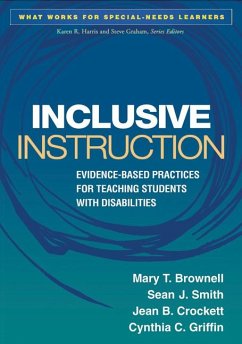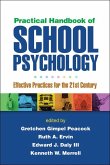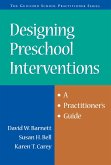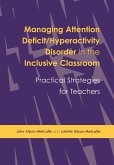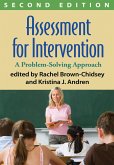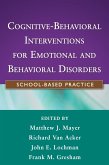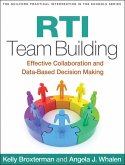Mary T Brownell, Sean J Smith, Jean B Crockett, Cynthia C Griffin
Inclusive Instruction
Evidence-Based Practices for Teaching Students with Disabilities
Mary T Brownell, Sean J Smith, Jean B Crockett, Cynthia C Griffin
Inclusive Instruction
Evidence-Based Practices for Teaching Students with Disabilities
- Broschiertes Buch
Andere Kunden interessierten sich auch für
![Practical Handbook of School Psychology Practical Handbook of School Psychology]() Practical Handbook of School Psychology66,99 €
Practical Handbook of School Psychology66,99 €![Designing Preschool Interventions Designing Preschool Interventions]() David W BarnettDesigning Preschool Interventions47,99 €
David W BarnettDesigning Preschool Interventions47,99 €![Managing Attention Deficit/Hyperactivity Disorder in the Inclusive Classroom Managing Attention Deficit/Hyperactivity Disorder in the Inclusive Classroom]() John Alban-MetcalfeManaging Attention Deficit/Hyperactivity Disorder in the Inclusive Classroom52,99 €
John Alban-MetcalfeManaging Attention Deficit/Hyperactivity Disorder in the Inclusive Classroom52,99 €![Assessment for Intervention Assessment for Intervention]() Assessment for Intervention42,99 €
Assessment for Intervention42,99 €![Cognitive-Behavioral Interventions for Emotional and Behavioral Disorders Cognitive-Behavioral Interventions for Emotional and Behavioral Disorders]() Cognitive-Behavioral Interventions for Emotional and Behavioral Disorders52,99 €
Cognitive-Behavioral Interventions for Emotional and Behavioral Disorders52,99 €![RTI Team Building RTI Team Building]() Kelly BroxtermanRTI Team Building46,99 €
Kelly BroxtermanRTI Team Building46,99 €![Choice Theory in the Classroom Choice Theory in the Classroom]() William GlasserChoice Theory in the Classroom13,99 €
William GlasserChoice Theory in the Classroom13,99 €-
-
-
Produktdetails
- Verlag: Guilford Publications
- Seitenzahl: 220
- Altersempfehlung: 5 bis 13 Jahre
- Erscheinungstermin: 3. April 2012
- Englisch
- Abmessung: 254mm x 180mm x 13mm
- Gewicht: 417g
- ISBN-13: 9781462503889
- ISBN-10: 1462503888
- Artikelnr.: 34462916
Hinweis: Dieser Artikel kann nur an eine deutsche Lieferadresse ausgeliefert werden.
- Herstellerkennzeichnung
- Libri GmbH
- Europaallee 1
- 36244 Bad Hersfeld
- gpsr@libri.de
 Mary T. Brownell, PhD, is the Irving and Rose Fien Endowed Professor of Education and Director of the National Center to Inform Policy and Practice in Special Education Professional Development at the University of Florida. Over the course of her career, Dr. Brownell has focused her work on special education teacher quality and retention, teacher development through collaboration and Reading First coaching, education for teachers working with students with disabilities and other high-risk learners, and professional development in literacy for teachers of high-risk learners. She has published over 50 book chapters and articles and has been recognized by the University of Florida with two teaching and research awards.  Sean J. Smith, PhD, is Associate Professor of Special Education at the University of Kansas in Lawrence. Dr. SmithâEUR(TM)s background is in the area of special education and technology, and he has authored and presented a number of articles on the subject. He is also a project director for several U.S. Department of Education program initiatives on the integration of technology components into teacher preparation programs and classroom instruction for students with disabilities and on the development of a virtual social skills training experience for students with autism. Dr. Smith is an associate editor of Teaching Exceptional Children and has served as an associate editor of the Journal of Special Education Technology.  Jean B. Crockett, PhD, is Professor and Director of the School of Special Education, School Psychology, and Early Childhood Studies at the University of Florida. Dr. CrockettâEUR(TM)s research interests address the relationship between policy reform initiatives and the instruction of exceptional learners. She is the author of more than 40 publications on instructional programming and placement issues for students with disabilities; the conceptual, historical, and legal foundations of special education; and frameworks for conducting special education in contemporary schools. Dr. Crockett is a past president of the Division for Research of the Council for Exceptional Children and the special education editor for the Journal of Law and Education.  Cynthia C. Griffin, PhD, is Professor in the School of Special Education, School Psychology, and Early Childhood Studies at the University of Florida. Dr. GriffinâEUR(TM)s early research focused on intervention studies in reading for students in inclusive elementary classrooms. She also coordinated internship programs in special education and studied novice special education teachers. She subsequently pursued intervention research focused on elementary school mathematics for students with disabilities. Dr. Griffin is studying teachersâEUR(TM) knowledge of mathematics, their classroom practices, and the influence these factors have on student achievement in math. She has been recognized as a University of Florida Research Professor. Â
I. Recognizing Our Professional Responsibilities to Students and
Understanding Their Needs 1. Recognizing Professional Responsibilities to
Students with Disabilities in Inclusive Classrooms 2. Recognizing the
Individual Needs of Students with High-Incidence Disabilities 3.
Recognizing the Qualities of Successful Inclusive Teachers 4. Recognizing
the Need for Collecting Meaningful Data II. Responding with Effective
Instruction and Technology Supports 5. Planning Effective Classroom
Instruction 6. Fostering Concept Development 7. Creating Strategic Learners
8. Building Fluent Skills Use 9. Managing Inclusive Classrooms, with
Kristin Murphy 10. Using Evidence and Collaborative Inquiry Successfully in
Inclusive Classrooms, with Elizabeth Filippi
Understanding Their Needs 1. Recognizing Professional Responsibilities to
Students with Disabilities in Inclusive Classrooms 2. Recognizing the
Individual Needs of Students with High-Incidence Disabilities 3.
Recognizing the Qualities of Successful Inclusive Teachers 4. Recognizing
the Need for Collecting Meaningful Data II. Responding with Effective
Instruction and Technology Supports 5. Planning Effective Classroom
Instruction 6. Fostering Concept Development 7. Creating Strategic Learners
8. Building Fluent Skills Use 9. Managing Inclusive Classrooms, with
Kristin Murphy 10. Using Evidence and Collaborative Inquiry Successfully in
Inclusive Classrooms, with Elizabeth Filippi
I. Recognizing Our Professional Responsibilities to Students and
Understanding Their Needs 1. Recognizing Professional Responsibilities to
Students with Disabilities in Inclusive Classrooms 2. Recognizing the
Individual Needs of Students with High-Incidence Disabilities 3.
Recognizing the Qualities of Successful Inclusive Teachers 4. Recognizing
the Need for Collecting Meaningful Data II. Responding with Effective
Instruction and Technology Supports 5. Planning Effective Classroom
Instruction 6. Fostering Concept Development 7. Creating Strategic Learners
8. Building Fluent Skills Use 9. Managing Inclusive Classrooms, with
Kristin Murphy 10. Using Evidence and Collaborative Inquiry Successfully in
Inclusive Classrooms, with Elizabeth Filippi
Understanding Their Needs 1. Recognizing Professional Responsibilities to
Students with Disabilities in Inclusive Classrooms 2. Recognizing the
Individual Needs of Students with High-Incidence Disabilities 3.
Recognizing the Qualities of Successful Inclusive Teachers 4. Recognizing
the Need for Collecting Meaningful Data II. Responding with Effective
Instruction and Technology Supports 5. Planning Effective Classroom
Instruction 6. Fostering Concept Development 7. Creating Strategic Learners
8. Building Fluent Skills Use 9. Managing Inclusive Classrooms, with
Kristin Murphy 10. Using Evidence and Collaborative Inquiry Successfully in
Inclusive Classrooms, with Elizabeth Filippi

